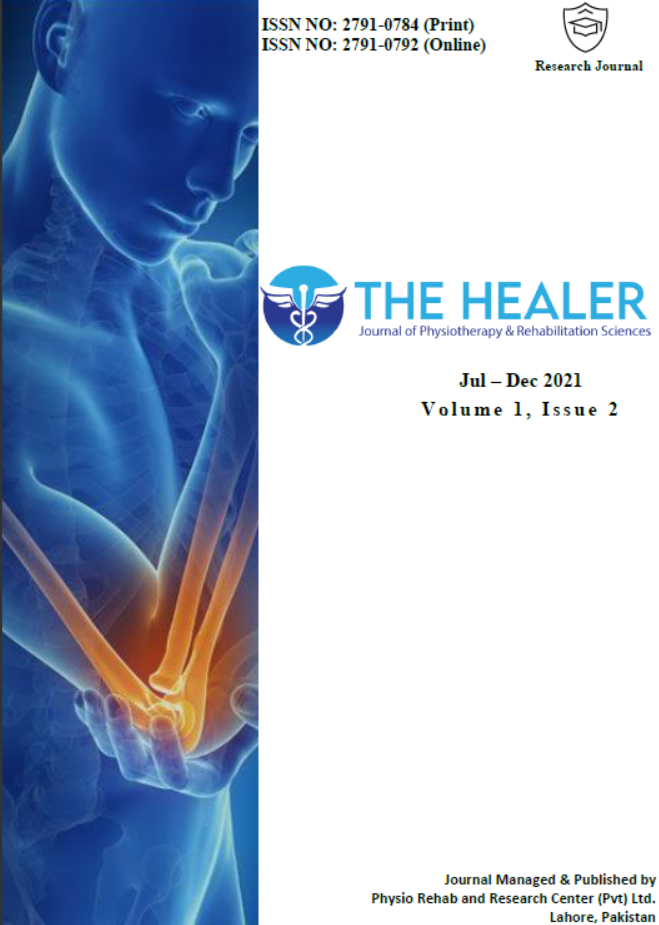Frequency of COVID-19 Symptoms and their Effects on Fetal Movement, Heart Beat and Stress Level during Pregnancy
DOI:
https://doi.org/10.55735/thjprs.v1i2.36Keywords:
COVID-19, fetal development, pregnancyAbstract
Abstract
Background: Studies have showed that pregnant ladies are more vulnerable to COVID-19 as they are more susceptible to respiratory diseases. But little is known about coronavirus disease particularly about its effects on pregnant females and infants, and there is no definitive evidence-based guidance specific to these females regarding the assessment or treatment of this disease. Objective: The objective is to evaluate the effects of COVID-19 on fetal movement, heart beat and stress level in pregnancy and also to calculate the frequency of COVID-19 symptoms. Methods: This observational study was performed at Jinnah Hospital, from 7th October 2020 to 20th February 2021. It involved 61 covid-19 pregnant females selected by using non-probability convenient sampling. All assessments received ethical approval with informed consent taken from all participants and approval obtained from ethical committee of the hospital. Patients were excluded if they have gestational diabetes, hypertension, complicated pregnancy or history of other diseases. A pre-tested structured questionnaire was formulated for the assessment of effects of COVID-19 that contain questions related to acute respiratory syndrome in COV-19 respondents during pregnancy. Results: The mean age of these participants was 29.51± 4.44years and patients suffering COVID-19 frequently from fever (100%), cough 54 (88.4%), 53 (86.9%) shortness of breath, 45(73.8%) sore throat, 33(54.1%) headache, 40 (65.6%) muscle or body aches, 31 (50.8%) runny nose, 31(50.8%) fatigue or excessive sleepiness, 19 (31.1%) diarrhea, nausea or vomiting, 49(80.3%) loss of sense of taste and smell, 24 (39.3%) itchy red eyes. Almost 29 (47.5%) females had undergone caesarean section, 46(75.4%) females’ health care providers cancelled some of their prenatal visits, 9 (14.8%) females’ family members were not permitted to attend delivery or visit after delivery, 17 (27.9) females separated from baby after delivery and 22 (36.1%) changed planning from breastfeed to formula milk. Consequence of stress about birth and new born experience was mild to moderate in COVID-19 affected women (2.77±0.864). Stress about changes in prenatal care was moderate (2.90±0.83). Conclusion: The results show that COVID-19 did not had any effect on fetal movement and heart beat as well, but pregnant women had significant stress about their prenatal care.
*Corresponding Author: Kanza Khan. Jinnah Hospital, Lahore, Pakistan, Email; kanza.khan082894@gmail.com
Citation: Khan K. 2021. Effects of COVID-19 symptoms on fetal movement and heart beat during pregnancy. The healer journal of physiotherapy and rehabilitation sciences:1(2):63-67
Abstract
Background: Studies have showed that pregnant ladies are more vulnerable to COVID-19 as they are more susceptible to respiratory diseases. But little is known about coronavirus disease particularly about its effects on pregnant females and infants, and there is no definitive evidence-based guidance specific to these females regarding the assessment or treatment of this disease. Objective: The objective is to evaluate the effects of COVID-19 on fetal movement, heart beat and stress level in pregnancy and also to calculate the frequency of COVID-19 symptoms. Methods: This observational study was performed at Jinnah Hospital, from 7th October 2020 to 20th February 2021. It involved 61 covid-19 pregnant females selected by using non-probability convenient sampling. All assessments received ethical approval with informed consent taken from all participants and approval obtained from ethical committee of the hospital. Patients were excluded if they have gestational diabetes, hypertension, complicated pregnancy or history of other diseases. A pre-tested structured questionnaire was formulated for the assessment of effects of COVID-19 that contain questions related to acute respiratory syndrome in COV-19 respondents during pregnancy. Results: The mean age of these participants was 29.51± 4.44years and patients suffering COVID-19 frequently from fever (100%), cough 54 (88.4%), 53 (86.9%) shortness of breath, 45(73.8%) sore throat, 33(54.1%) headache, 40 (65.6%) muscle or body aches, 31 (50.8%) runny nose, 31(50.8%) fatigue or excessive sleepiness, 19 (31.1%) diarrhea, nausea or vomiting, 49(80.3%) loss of sense of taste and smell, 24 (39.3%) itchy red eyes. Almost 29 (47.5%) females had undergone caesarean section, 46(75.4%) females’ health care providers cancelled some of their prenatal visits, 9 (14.8%) females’ family members were not permitted to attend delivery or visit after delivery, 17 (27.9) females separated from baby after delivery and 22 (36.1%) changed planning from breastfeed to formula milk. Consequence of stress about birth and new born experience was mild to moderate in COVID-19 affected women (2.77±0.864). Stress about changes in prenatal care was moderate (2.90±0.83). Conclusion: The results show that COVID-19 did not had any effect on fetal movement and heart beat as well, but pregnant women had significant stress about their prenatal care.
*Corresponding Author: Kanza Khan. Jinnah Hospital, Lahore, Pakistan, Email; kanza.khan082894@gmail.com
Citation: Khan K. 2021. Effects of COVID-19 symptoms on fetal movement and heart beat during pregnancy. The healer journal of physiotherapy and rehabilitation sciences:1(2):63-67
Downloads

Downloads
Published
License
Copyright (c) 2022 The Healer Journal of Physiotherapy and Rehabilitation Sciences

This work is licensed under a Creative Commons Attribution 4.0 International License.














